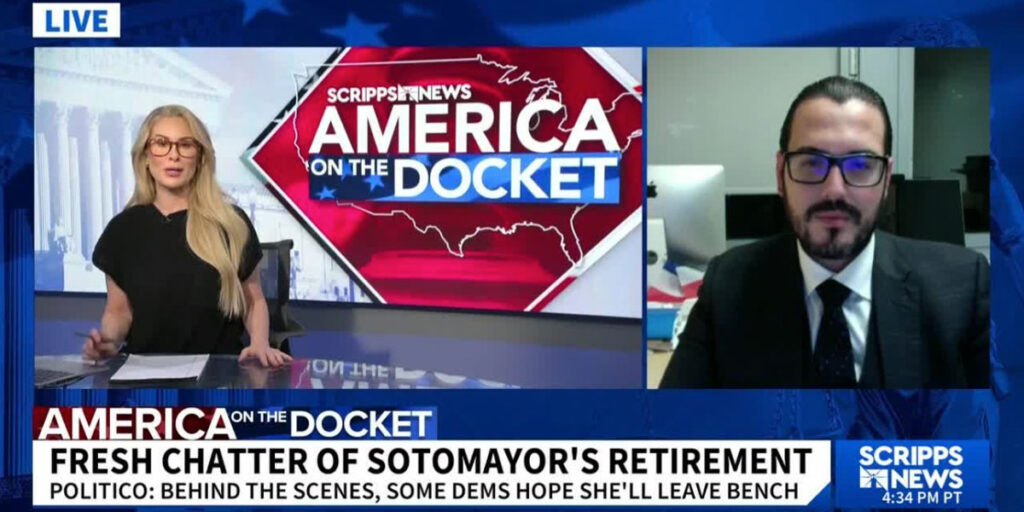Insights from Russell Morgan on the Supreme Court’s Future Amid Political Pressures
Joining us today is Russell Morgan, founder and partner of Morgan Legal Group, to discuss the critical issue surrounding potential Supreme Court vacancies and Justice Sonia Sotomayor’s tenure. Democrat Senator Elizabeth Warren’s statement that “The Supreme Court is on the ballot” emphasizes the urgency many Democrats feel about securing the court’s ideological balance. However, as Morgan points out, the likelihood of Justice Sotomayor stepping down before the upcoming inauguration remains low.
Likelihood of Justice Sotomayor’s Retirement
When asked about the probability of Justice Sotomayor retiring, Morgan expressed doubt. “Justice Sotomayor is relatively young, especially by Supreme Court standards, where justices often serve well into their 80s,” he explained. “The Democrats’ window to appoint a successor is rapidly closing, and even if discussions around her resignation were to gain momentum, it is unlikely that her departure could be arranged before the inauguration.”
Potential Republican Tactics to Block a Liberal Replacement
If Justice Sotomayor were to retire, the Republicans, currently holding a Senate majority, could attempt to prevent a liberal replacement from being appointed. “With their majority, Republicans can vote against a Democratic candidate and potentially nominate a conservative choice of their own,” Morgan noted. “This majority creates significant challenges for the Democrats, even if they were able to present a candidate.”
Considerations for Justice Sotomayor’s Decision
As the discussion explores the responsibilities of a Supreme Court justice, Morgan reflected on the broader implications of Justice Sotomayor’s potential choice to remain on the bench. “While justices are appointed for life and may serve as long as they are capable, there is an argument that they owe it to their party to consider the impact of staying on. If Justice Sotomayor remains on the bench for another decade, it could result in a conservative replacement serving for 40 or 50 years,” he explained.
Morgan emphasized that this is a weighty consideration for Justice Sotomayor: “She must consider if it would be better for her party to step aside, allowing a younger, liberal candidate to be appointed who could influence the court for generations.”
Can the Supreme Court Remain Neutral in a Politically Charged Era?
The conversation then turned to the issue of political leanings within the Supreme Court and whether the justices can safeguard the institution’s neutrality. “The Supreme Court is the highest court of the land, and justices are bound to uphold the U.S. Constitution, irrespective of personal political beliefs,” Morgan stated. “It is imperative that justices focus on their constitutional duties, setting aside partisan perspectives.”
Despite bipartisan pressures, Morgan believes that maintaining neutrality is paramount: “Justice Sotomayor, like all justices, must weigh the broader impact of her decisions on the court’s integrity and the country’s future. This includes considering if a younger appointee might more effectively uphold the Constitution without partisan bias.”
The Role of the Public in Supreme Court Appointments
Russell Morgan highlighted that public opinion increasingly influences judicial appointments. “The public’s voice is integral in shaping the decisions of elected representatives. As we saw in recent years, public opinion can sway the stance of key decision-makers in Congress and beyond,” Morgan stated. This trend makes it crucial for the public to stay informed about potential changes within the Supreme Court and understand how these changes could affect legal precedents.
The Impact of a Conservative Supreme Court Shift
Another area Morgan touched upon was the potential consequences of a conservative shift on the Supreme Court. “If more conservative justices are appointed, we could see substantial changes in federal policies, particularly in areas like reproductive rights and healthcare,” he explained. With issues such as a potential federal abortion ban on the line, Morgan noted that the ideological composition of the court could greatly influence the direction of U.S. law for decades.
Understanding the Appointment Process: A Delicate Balance
The appointment process for Supreme Court justices, according to Morgan, is carefully structured but subject to political maneuvering. “The process is designed to ensure fair and qualified appointments, yet it can become highly politicized, especially when the Senate majority is not aligned with the executive branch,” he elaborated. Morgan highlighted the importance of transparency in this process and the role of the Senate Judiciary Committee in confirming nominees.
Conclusion
The potential for a Supreme Court vacancy brings into focus the complex interplay between law and politics in the United States. Justice Sotomayor’s decision, if any, will undoubtedly impact the future of the court. As Russell Morgan insightfully points out, the decision holds immense weight, not only for the Democratic Party but for the direction of the nation’s highest court.









